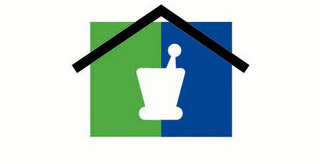When we last visited DeliverMed Holdings, LLC v. Schaltenbrand, plaintiff DeliverMed had lost on all claims, including on some copyright and trademark theories. DeliverMed appealed the holdings that it was not the owner of the copyright in this logo
and that the copyright registration was invalid.
The district court was colorful in its description of the case and the appeals court was no less so. This gives you some flavor (and perhaps also gives us an understanding of why this case has lingered against all common sense):
Soon after the partnership started gaining steam, however, the partners began exploiting their informal arrangement for personal gain. [Plaintiff] Swift, [defendant] Siddle, and [defendant] Schaltenbrand repeatedly requested (and received) profit distributions that far exceeded the amounts to which they were entitled under the agreement. Despite the fact that the partnership was a money-losing enterprise, the partners continually found the funds for distributions. For example, evidence presented to the district court indicated that, from 2005 to 2009, the partnership operated at a net loss of over $400,000. During this same period, however, Swift, Schaltenbrand, and Siddle received nearly $4 million in combined distributions. Swift even persuaded Schaltenbrand to take out loans to facilitate these unjustified payments to the partners. For his part, Swift concealed his excessive demands (which he knew had no basis in the actual profitability of the partnership) by commingling them with DeliverMed’s requests for cost reimbursements. Swift and Schaltenbrand each became aware of the other’s excessive distributions, but neither of them cared. So long as each partner was able to obtain his own unjustified share of partnership funds, no one made a fuss.
In between raids of partnership coffers, the partners occasionally found time to tend to their mail-order pharmacy business….
The appeals court affirmed the lower court on the ownership of the copyright, i.e., that the copyright was owned by the independent contractor who had designed it. The appeals court even affirmed the uncommon award of attorney’s fees to the defendant for its defense of the copyright claim. The appeals court reversed on one thing, though: it reversed the court’s invalidation of the copyright registration because of a technicality, the trial court’s failure to comply with a statutory requirement that the Copyright Office be asked to opine in cases where there is an allegation of inaccurate information in the application.
The requirement was added to the Copyright Act in the Prioritizing Resources and Organization for Intellectual Property Act (“Pro IP Act”) of 2008. Section 411 was amended to add:
In any case in which inaccurate information described under paragraph (1) is alleged [i.e., inaccurate information was included on the application for copyright registration with knowledge that it was inaccurate and the inaccuracy of the information, if known, would have caused the Register of Copyrights to refuse registration], the court shall request the Register of Copyrights to advise the court whether the inaccurate information, if known, would have caused the Register of Copyrights to refuse registration.
The DeliverMed court didn’t do this; it simply “relied on its own speculation” that the Copyright Office would have rejected the application. So even though the district court’s reasoning “seems consistent with the Register’s practice,” the case will be remanded solely for the purpose of satisfying this statutory requirement.
Um – when the Copyright Office learns the trial court’s legal conclusion, affirmed on appeal, that the applicant doesn’t own the copyright? I’m thinking “no” is the pretty clear answer. But the appeals court, having raised the issue sua sponte, points out that “ignoring a clear statutory directive due to the inadvertence of the parties would defeat the purpose of 17 U.S.C. § 411(b)(2) and deprive the Register of its [sic – the Register of Copyrights is a “her,” thank you very much] right to weigh in on precisely this issue.”
But the case exposes an interesting possibility. Here, there was evidence that the applicant for copyright deliberately misrepresented facts about the conveyance to him, but what if the applicant didn’t know there was a problem in the chain of title? He still wouldn’t own the copyright, but the registration wouldn’t be invalidated. So there would be an existing, valid registration, one of the predicates for standing for a copyright infringement claim, but the registrant wouldn’t own the copyright, another predicate for standing. I suppose no harm, but loopholes make me nervous.
DeliverMed Holdings, LLC v. Schaltenbrand, Nos. 12-3773, 12-3774 (7th Cir. Oct. 7, 2013).

The text of this work is licensed under a Creative Commons Attribution-No Derivative Works 3.0 United States License.


Leave a Reply